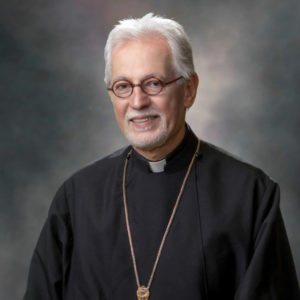Given the ongoing developments in the Middle East, the Armenian Assembly of America (Assembly) announced a special panel on Christians persecuted in the region as one of the briefings at the National Advocacy Conference in Washington, D.C. on September 24, 2018.
Speakers on this panel, entitled “Christians At-Risk in the Middle East” are National Council of Churches (NCC) President and General Secretary Jim Winkler, General Board of Church and Society of The United Methodist Church Director Rev. Dr. Susan Henry-Crowe, The Religious Freedom Institute (RFI) Executive Director Kent Hill, and
Georgetown University Professor and Berkley Center Director Shaun Casey. The panel will be moderated by Armenian Church of America (Eastern Diocese) Diocesan Legate Archbishop Vicken Aykazian, former
NCC President and member of President Barrack Obama’s Advisory Committee on Faith Based Initiatives.
“This timely panel on the realities of Christians and religious minorities in the Middle East is more important today than ever before. I have witnessed the conditions of the Christian communities in the region, and in the past year I have traveled many times to the region and heard directly from the people who are victimized on a daily basis,” stated Archbishop Aykazian, the panel moderator. “Having worked with panelists on earlier occasions, I know that their firsthand knowledge will be beneficial for the National Advocacy Conference attendees to hear, especially members of the Armenian Diaspora. I encourage everyone to attend this briefing during the Advocacy Conference” he added.
President and General Secretary Winkler has been a lifelong social justice advocate and held a deep passion for ecumenical and interreligious work. In 2013, he was elected as President and General Secretary of the NCC, an ecumenical partnership of thirty-eight Christian faith groups in the United States. Its member denominations,
churches, conventions, and archdioceses include Protestant, Anglican, Orthodox, Evangelical, historic African-American, and Living Peace traditions. Together, they encompass more than 100,000 local congregations and 40 million Christians. Winkler is the public voice of the NCC and represents the Council as it addresses two major
priorities: mass incarceration and interreligious relationships with a focus on peace.
Rev. Dr. Henry-Crowe has led the General Board of Church and Society of The United Methodist Church since the spring of 2014. The General Board of Church and Society is dedicated to the work of living faith, seeking justice, and pursuing peace. Through its advocacy, members communicate with policymakers and leaders around the world addressing social issues. Rev. Dr. Henry-Crowe has been repeatedly recognized for her work and commitment to social justice, and in 2000 was named Chaplain of the Year by the General Board of Higher Education &
Ministry. She has focused on fostering interreligious dialogue and advocating inclusiveness of all beliefs.
Kent Hill joined the RFI after six years as Senior Vice President at World Vision, one of the largest faith-based relief and development organizations in the world. He also served for eight years as Assistant Administrator for the U.S. Agency for International Development (USAID), responsible for U.S. foreign assistance to Eastern Europe and the former Soviet Union, especially worldwide USAID health programs. An expert on democracy, international development policy, and religious freedom issues, he has extensive experience with multiple U.S. government departments and agencies, assistance agencies from other countries, and hundreds of U.S. and international NGOs,
including faith-based organizations. Earlier in his career, Dr. Hill was President of D.C.’s Institute on Religion and Democracy. In 2010, as a Vice President at the John Templeton Foundation, Hill, along with Tom Farr, conceived Georgetown’s Religious Freedom Project and secured funding to launch the project.
Casey is a senior fellow at the Berkley Center for Religion, Peace, and World Affairs as well as a Professor in the School of Foreign Service. Located at Georgetown University, The Berkley Center is dedicated to the interdisciplinary study of religion, ethics, and public life. Through research, teaching, and service, the Center explores global challenges to democracy and human rights; economic and social development; international diplomacy; and interreligious understanding. Casey was previously U.S. Special Representative for Religion and Global Affairs and Director of the U.S. Department of State’s Office of Religion and Global Affairs. He has also held positions at Wesley Theological Seminary in Washington, D.C., the Center for American Progress, and the Center for Strategic and
International Studies.
The Armenian Assembly has regularly testified about the need to protect Christian communities at risk and has worked with Congress on assistance to Christians in the Middle East, and has supported legislation such as House Resolution 390, the bipartisan Iraq and Syria Genocide Emergency Relief and Accountability Act of 2017
spearheaded by Helsinki Commission Co-Chair Rep. Chris Smith (R-NJ) and Religious Minorities in the Middle East Caucus Co-Chair Rep. Anna Eshoo (D-CA).
The National Advocacy Conference itinerary includes a welcome reception, panel discussions, training, meetings on Capitol Hill, and concludes with a special evening Gala.
For more information on the Advocacy Conference, visit www.aimhye.com or contact Assembly Grassroots and Development Associate Mariam Khaloyan at (202) 393-3434 ext. 337 or by email at [email protected].
Established in 1972, the Armenian Assembly of America is the largest Washington-based nationwide organization promoting public understanding and awareness of Armenian issues. The Assembly is a non-partisan, 501(c)(3) tax-exempt membership organization.




















































